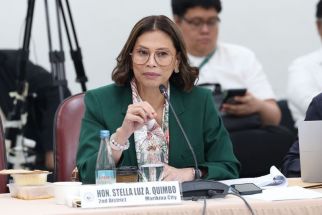Voci Celesti opera gala/Ambassador Domecq endorses Phl-Spanish Perro Berde
‘Voci Celesti’ (rough translation: celestial voices), which was presented at the Philamlife Theater, did not fully rise to expectations, either vocally or interpretitively. Only a few of the voices were “celestial.” Candidly, what seemed immediately obvious was that the Filipino singers far outshone their Asian peers from Shanghai, Taipei, Hong Kong and Kuala Lumpur.
Chau Huei Min (her hand movements were rather awkward) who sang an aria from Donizetti’s ‘Don Pasquale,’ Chen Xiao Qun who rendered an aria from Mozart’s ‘The Magic Flute,’ and Eric Seo Yue Shian, in an aria from Mozart’s ‘Marriage of Figaro,’ were not vocally impressive; Eric could hardly be heard in the aria, or in ‘0l’ Man River’ from Jerome Kern’s ‘Show Boat.’ The three were wanting in fervor and passion in emphasis of textual meaning.
Rising to expectations were tenor Patrick Jian in ‘Una furtiva lagrima’ from Donizetti’s L’Elisir d’Amore’ and in Leoncavallo’s ‘Matinata’ — his tones forceful, firm and secure — and baritone Albert Lin Chun whose strong, sonorous and resonant voice was heard in Bizet’s ‘Pearl Fishers’ duet as he sang with Filipino tenor Juan Alberto Gaerlan.
After intermission, Chau Huei Min in ‘Je veux vivre’ (I Want to Live) from Gounod’s ‘Romeo and Juliet,’ and Li Ming Yue in ‘Lo son l’umilo aucella’ (I am the humble servant of the creative spirit) from Cilea’s ‘Adriana Lecouvreur’ improved, their tonal colors having grown richer.
Elaine Lim Lee, who was identified as a member of the Filipino contingent despite her Chinese name, danced spiritedly while singing the aria from Lehar’s ‘Giuditta.’ However, her vocal performance did not match her dancing. She fared much better in the duet from ‘Traviata’ with tenor Sherwin Sozon as Alfredo.
I once wrote of Sozon thus: ‘His powers surfaced impressively — a firm, ringing, forceful voice, interpretive ability and control of volume.’ After listening to his duet and the aria ‘E luceven le stelle’ (When the stars were shining brightly) from Puccini’s ‘Tosca,’ I had no reason to revise my earlier observation.
Tenor Gaerlan, his timber rather metallic, nevertheless held the audience in thrall in ‘Ah! Leve toi soleil’ (Ah! Rise, sun!) from Gounod’s ‘Romeo and Juliet,’ splendidly reaching and sustaining notes in the top register.
The highlights of ‘An Opera Gala’ were doubtless the solos of internationally multi-awarded baritone Andrew Fernando and eminent soprano Camille Lopez Molina — Vision fugitive’ from Massenet’s ‘Herodiade’ for Andrew, and ‘You dear hall’ from Wagner’s ‘Tannhauser’ for Camille — and the duet from Mascagni’s ‘Cavalleria Rusticana.’ Their projection in the arias was the night’s most powerfully engrossing; their emoting, the most dramatic. Together, they were a tremendous, astonishing duo.
The Five Tenors — Miguel Castro, David Ezra Cruz, Christian Magano, Johan Enriquez and Genmar Buntalilid — enchanted listeners with their vibrant, expressive, cohesive rendition of Adagio/Prayer in the Night, the former composed by R. Giazotto and T. Albinoni; the latter based on Handel’s ‘Sarabande’ and orchestrated by Orlando dela Cruz.
The concert concluded with the entire cast in The Drinking Song from Verdi’s ‘Traviata,’ some of the visiting singers holding scores.
Arturo Molina conducted the youthful, energetic Manila Symphony Orchestra in Rossini’s ‘Barber of Seville Overture’ and in the intermezzo from Mascagni’s ‘Cavalleria Rusticana,’ the former in a brisk, robust, rhythmically vigorous manner, the latter in an exquisitely lambent, flowing, lyrical fashion.
* * *
The following letter from the personable Spanish Ambassador Jorge Domecq endorses the Phil-Spanish cultural magazine Perro Berde.
El Embajador de España
February 22, 2012
Querida Rosalinda:
It is my pleasure to inform you that during a ceremony held last February 16 at the Instituto Cervantes de Manila, I launched the third issue of the Philippine-Spanish cultural magazine Perro Berde, published yearly by the Embassy of Spain in cooperation with the Instituto Cervantes that features interviews, reports, essays, etc. on the current Philippine-Spanish cultural situation and that of Latin America with respect to this country. This magazine is currently the only publication in the Spanish language existing in the Philippines.
I believe this third issue of the magazine, the first one being Perro Berde, strengthens this publication as a reference tool in the Philippine-Spanish cultural panorama for propagating our language as well as for promoting our cultural reality in this country.
Jorge Domecq
Spanish Ambassador Jorge Domecq and Instituto Cervantes director Eduardo Calvo launched the magazine. Mexican Ambassador Tomás Javier Calvillo and three of the featured artists, Mico Manalo, Tanya Tynjälä and Raya Martin, also graced the launching of Perro Berde.
Perro Berde is also sponsored by the Ministry of Education, Culture and Sports of Spain.
- Latest
- Trending


























